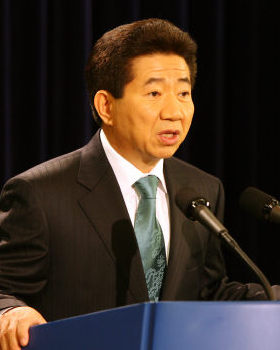 |
“Still, there are lots of things to discuss and I think their (U.S. troops') relocation to the Pyeongtaek base will eventually happen in 2010 or 2011, and the regaining of wartime control will be timed to coincide with that,” Roh said. Roh dismissed worries that South Korea's early retaking of the operational control would undermine its war-fighting capability, as that will diminish the U.S. security commitment on the peninsula. "Our defense capability has been continuously strengthened," Roh said. "Even if we get back the wartime operational control now, we can exercise it." South Korea has said it wishes to get back the wartime control by 2012, but the U.S. recently proposed transferring it by 2009, stoking security jitters in South Korea which is still technically in a state of war with North Korea. The U.S. proposal came amid persistent tension due to North Korea's multiple missile tests last month. South Korea's move to regain the wartime operational control of its military is a key policy goal of President Roh, who was elected on the platform of putting South Korea's ties with the U.S. to a more equal footing. Roh's government has already taken over several major security roles from the U.S., such as patrolling along the demilitarized zone. South Korea voluntarily put the operational control of its military under the American-led U.N. Command shortly after the three-year Korean War broke out in 1950. It took back the peacetime control of its forces in 1994, but the wartime operational control still lies in the hands of the chief of U.S.troops here. “The wartime operational control is the core of self-defense, and self-defense is the core of a self-reliant country,” Roh said. “When we have wartime operational control, we also can take the initiative in military talks with North Korea to ease tension and build up military confidence measures on the peninsula.” Roh said a change in South Korea's command system would lead to a small cut in the number of U.S. troops, but the size would not be any cause for concern. “We don't have to worry too much. U.S. troops will be continuously stationed (here) and the number does not have any decisive meaning. The quality-based capacity is important,” he said. The U.S. currently stations 30,000 troops in South Korea but plans to down-scale its forces to 25,000 troops by 2008. Washington officials said this would be compensated for by the introduction of more sophisticated weapons. "There is nothing wrong and our national security is perfect. The South Korean military's capability is sufficient and the Korea-U.S. alliance will not be shaken," Roh said. A roadmap for the operational control issue is to be finalized in October, when the defense chiefs of the two allies meet in Washington for annual talks, according to South Korean Defense Ministry officials earlier in the day. Seoul, Aug. 9 (Yonhap News)






